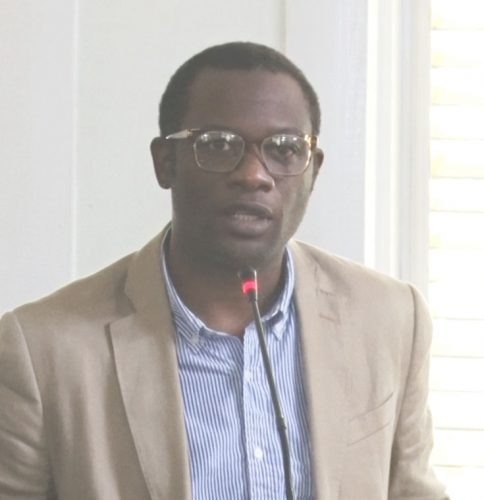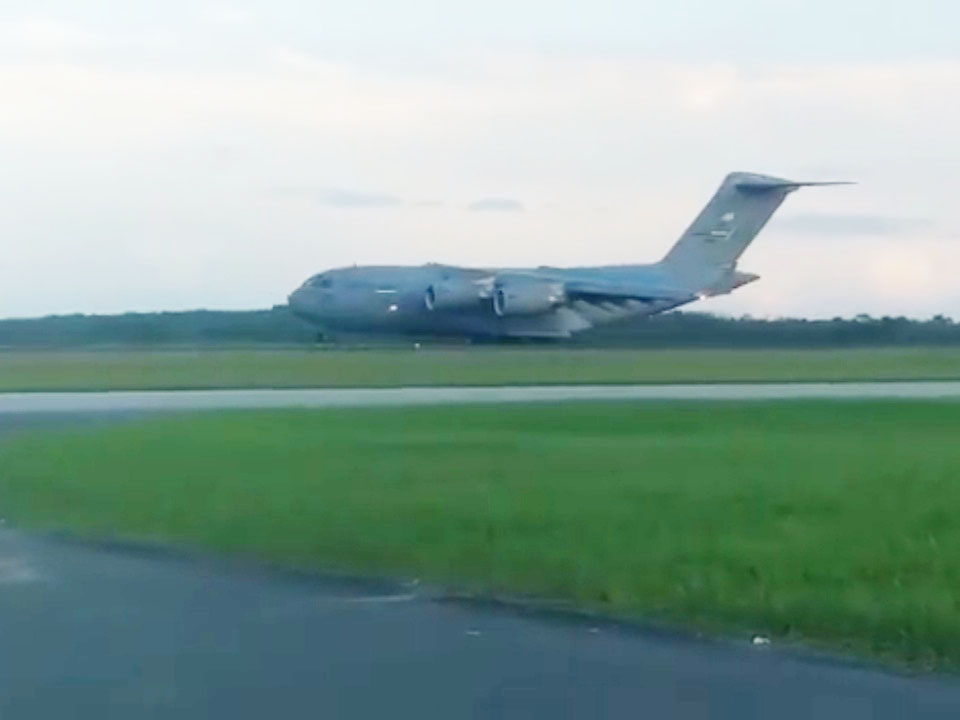With an agenda not yet fixed, a United States government team arrived yesterday in Guyana and will today begin preparations for Secretary of State Michael Pompeo’s visit later this week, Minister of Foreign Affairs Hugh Todd said.
“A team will be here [meeting with various officials] tomorrow; a preparation team. When that prepping team comes, we will have a more formal pronouncement on the details and so forth,” Todd told Stabroek News yesterday when contacted.
The Foreign Affairs Minister explained that there is much to be “mapped out” ahead of Pompeo’s visit as it is the first time such a high ranking US official has made a State Visit here and “with such a visit there has to be lots of security planning and an overall agenda set which requires a lot of work”.

“This is also not like a regular regional head of state visit that we are accustomed to. A lot of different preparations will have to go into this,” he added.
Todd said that he hopes by the end of today there will be an official announcement.
A US military passenger plane arrived in the country yesterday around 5:15 pm with the advance party, Head of the Guyana Civil Aviation Authority, retired Colonel Egbert Field confirmed.
Pompeo is expected to be in Guyana from Thursday, September 17 to Friday, September 18 and this newspaper understands that the Irfaan Ali government has already set up its own delegation for planned meetings. Those meetings are expected from Thursday evening.
Already, the Ali administration has been urged to make its position known on non-negotiable elements with respect to Venezuela.
Minister of Parliamentary Affairs and Governance Gail Teixeira has described the scheduled visit as “important and significant.”
“Especially in light of what has happened over the five months and the US government’s support to Guyana during that time this visit is important,” the minister stressed while explaining that she was unaware of whether it was a trip to the Caribbean and Latin America region or to Guyana alone.
The last time Pompeo visited the Caribbean region – in January – he ran afoul of then Chair of the Caribbean Community (CARICOM) Mia Mottley for failing to engage with all of CARICOM.
“As Chairman of CARICOM, it is impossible for me to agree that my Foreign Minister should attend a meeting to which members of CARICOM are not invited,” Mottley said at the time while suggesting that it would be an attempt at divide and rule among CARICOM countries “if some are invited and not all”.
Touring
Over the last month, Pompeo has been touring the world in what the Associated Press has described as an attempt to burnish the foreign policy credentials of President Donald Trump ahead of November’s presidential election.
Pompeo was most recently in Qatar, where the negotiating teams of the Taliban and the Afghan government have begun hammering out a road map for a post-war Afghanistan. These negotiations follow a peace deal the United States and the Taliban signed in February in Qatar’s capital of Doha.
On Saturday he was in Cyprus where he met with that country’s President Nicos Anastasiades. Then, he signed a MOU with Cyprus “to create a new training center to be funded by the United States” and built in that country. “It will provide expertise for the rest of the region on border security and nonproliferation. It will be known as the Cyprus Center for Land, Open-seas, and Port Security, or CYCLOPS,” he had said.
And Pompeo said on Twitter that “The Republic of Cyprus is a key partner in the Eastern Mediterranean and we are committed to deepening our bilateral relationship.”
In this region, the US government has been trying to drum up support against the Venezuelan government led by Nicolas Maduro.
Ahead of planned parliamentary elections in that country, Pompeo ann-ounced sanctions against four individuals he claimed were conspiring against free and fair elections. These include Indira Alfonso and Jose Gutierrez, who were appointed earlier this year by the pro-government Supreme Court to oversee the national electoral council, which has called elections for this December.
Pompeo had also been very vocal during the five-month long delay in the finalisation of Guyana’s general and regional elections process. His voice was one of the loudest calling for the APNU+AFC coalition to concede and allow for Ali to be sworn in as president.
Ali was sworn in on August 2 and two weeks after the United States’ Assistant Secretary of State Michael Kozak publicly thanked this country for supporting a Lima Group statement which, among other things, reiterated a firm commitment to Venezuela’s Juan Guaidó, who was referred to as interim president, and rejected “the illegitimate regime’s announcement it would hold parliamentary elections without the minimum guarantees and without the participation of all political forces.”
“Great to see Guyana adds its voice for the call to restore democracy in Venezuela. The US encourages all democratic countries to commit to helping the Venezuelan people achieve a peaceful, prosperous and democratic future,” Kozak had tweeted.
Guyana, however, is not listed as one of the countries which signed the joint statement that was issued and no member of the Guyana government has acknowledged its contents.
This action has been seen by some as an attempt by the US government to steer Guyana’s foreign policy position on Venezuela.
It is its policy on Venezuela that the Guyana Human Rights Association (GHRA) on Saturday urged government “to make public, well in advance of the visit, what are the non-negotiable elements with respect to Venezuela” and “avoid any recklessness devised to interfere with electoral matters.”
Reminding that Guyana, in the context of the border controversy with Venezuela, has studiously avoided making any statement or taking any position on the domestic political situation in Venezuela, the GHRA stressed that “any attempt to entangle Guyana in other political initiatives which undermine Guyana’s position on the border (controversy) must not be entertained under any circumstances.
“Aligning Guyana with those seeking regime change not only threatens Guyana’s legal negotiations over the border, but it would also be politically absurd, since the current US candidate to replace the incumbent President of Venezuela is among the leaders of those supporting the illegal claim on Guyana’s territory,” it said, while adding that Guyana has also continued to resist efforts in recent years to be included in the many multi-national initiatives aimed at regime change in Venezuela.
All-party unity on the Venezuelan issue has been a feature of Guyanese politics over many administrations, the GHRA reminded.
“This tradition survived recent inter-party tensions with the new administration retaining the services of several senior members of the previous administration in the Ministry of Foreign Affairs responsible for negotiation on the border issue… the inclusion of Guyana’s name in the State Department list of countries supposedly calling for democratic change [therefore] poses serious problems,” it noted.






